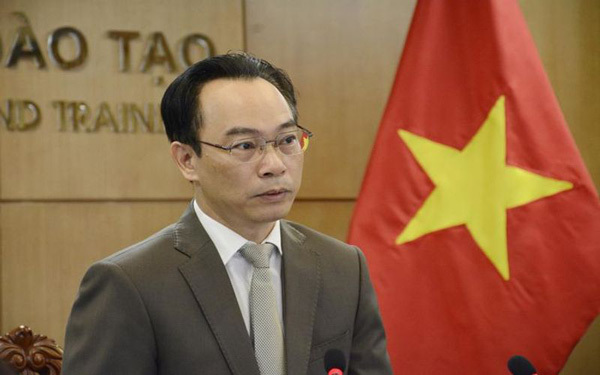Ly is a researcher at the Australia Research Council. She has published hundreds of articles in scientific journals and publications, including cross-country research projects.

Prof Dr Tran Thi Ly, lecturer at Deakin University
She has the highest number of scientific publications in the social Sciences of any Vietnamese female scientist, according to Scopus statistics.
Before becoming a famous scientist in Australia, Ly graduated from Hue University and became a lecturer at the school.
“It was 2001 when I obtained an Australian government scholarship to study for a master’s degree at Monash University,” she said.
While studying in Australia, she found that the biggest barrier for students was adapting to the new study and research environment.
“Despite a lot of changes, Vietnam’s curricula remain too heavy in facts and information and there is too much attention paid to exams,” she said.
“While studying for a bachelor’s degree in Vietnam, we had nearly 10 subjects within one semester and many tests,” she said. “While studying for a master’s degree at Monash University, I had only two or three subjects each semester."
However, students at Monash must endeavor to explore, research, listen to lectures, and synthesize and analyze for the most effective learning.
More than one year later, she successfully defended her thesis to obtain a master’s degree and won a prize for best international student in education. This helped her continue her study for a doctorate and have opportunities to work for universities in Australia.
After a period of working for Monash and RMIT universities, Ly was invited to work at Deakin University in 2013.
Many international students were surprised when meeting their lecturer, a young Vietnamese woman. Ly said sometimes she as mistaken for a ‘new student’, but a lecturer’s prestige doesn’t come from age or position, but in their knowlege and way of transmitting it.
She always prepares her lesson plans carefully, though she has been teaching the same subjects for six to seven years. Her students, who can see her effort and seriousness, respect the lecturer. They find it interesting when she talks about Vietnamese culture and the teaching methods in Vietnam.
Cross-country reserach projects
Having opportunities to cooperate with colleagues from many universities around the world, including Vietnamese, Ly realized that ‘cross-country connections’ improve the research capability of young scientists.
“In modern times, it is not important where scientists are. No matter where they live, they still have many opportunities to work and devote themselves to their favorite fields,” she said.
In the last 23 years, she has cooperated with over 70 schorlars and reserachers from Australia, Vietnam, China, Malaysia, Japan, Taiwan, the Philippines, Hong Kong, the US, UK and the Netherlands.
Her research mostly focuses on international cooperation and the encouragement of international mobility in higher education. Her work has relations to Vietnam.
One of her research projects funded by the Australian government focused on analyzing the impact from Australian students' short-term learning and internships in Vietnam through the New Colombo Plan program.
“This is reverse student mobility. We often hear that Vietnamese students go to study abroad. But under this project, we analyze a new phenomenon which is important and has potential for Vietnam: students from developed countries such as Australia, the US and UK come to Vietnam to study or spend short-term internships,” she said.
Vietnam has become the fourth favorite destination for Australian students who want to attend short-term training courses or internships, following China, India and Indonesia.
|
The educational sector needs to closely cooperate with other sectors, such as tourism, culture and diplomatic sector, to build an image of Vietnam as an attractive destination for students,”
Prof Dr Tran Thi Ly, lecturer at Deakin University |
A report from the Australian Ministry of Foreign Affairs showed that in 2014-2018, the number of Australian students going to Vietnam to study and take internships funded by the Australian government under the New Colombo Plan increased by five times. Over 3,600 students had come by the end of 2019.
Opportunity to export education
With the project, Ly recommends building Vietnam into a sustainably favorite destination for Australian students.
Australian students who come to Vietnam can learn many things, from professional knowledge to language to culture. They also act as a bridge that helps strengthen international cooperation in education, student exchange, and economic and diplomatic relations between the two countries.
“I think that in order to take full advantage of the potential, Vietnam, at first, needs to have an organization representing Vietnam’s universities which will popularize the image of Vietnam,” she said.
“The educational sector needs to closely cooperate with other sectors, such as tourism, culture and diplomatic sector, to build an image of Vietnam as an attractive destination for students,” she said.
For a 3-month training course, for example, one month would be reserved for students’ studying at universities, one month for internship, and the remaining month learning about the culture and life of Vietnamese people.
“If Vietnam can do this, it will be able to export education,” she said.
Le Anh

Vietnam to accelerate digital transformation in higher education
In 2021, Vietnam’s education sector will accelerate the National Digital Transformation Program and implement digital transformation.

Autonomy in higher education in Vietnam facing challenges
Autonomy in higher education in Vietnam is facing challenges, particularly accountability and finances, according to Deputy Minister of Education and Training Hoang Minh Son.
